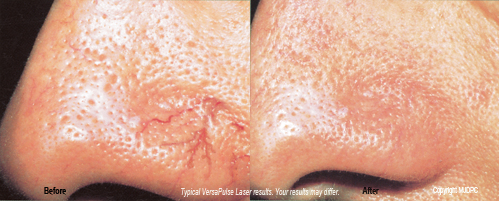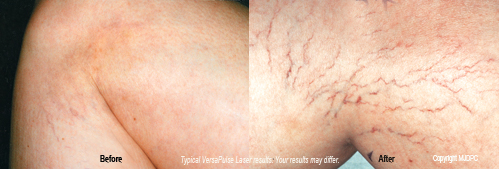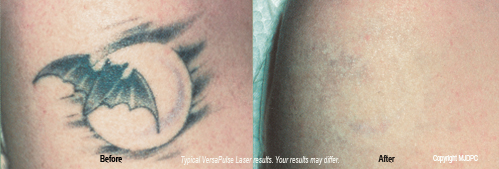Today's advanced laser technology allows us to safely, easily, painlessly and effectively treat many benign skin lesions, on an out-patient basis. The four main types of lasers used to treat various skin conditions are: argon, pulsed-dye, neodymium:YAG and carbon dioxide.

How does a VersaPulse® laser work?
The word LASER is an acronym for Light Amplification by the Stimulated Emission of Radiation. VersaPulse laser treatments are peformed by our doctor for patients in our region to gently remove unwanted, damaged, or diseased cells without harming the surrounding healthy cells. The VersaPulse laser's energy is delivered in short adjustable pulses, which minimizes bruising.

What is a vascular lesion?
Skin blemishes due to abnormal blood vessels located directly under your skin's surface that give the skin a red color are called vascular lesions. Port wine stains, strawberry hemangiomas and spider veins (telangiectasias) are all forms of vascular lesions.
What is a pigmented lesion?
Pigmented lesions are caused by a proliferation of melanocytes in the skin. Melanocytes are the cells that manufacture melanin, which is the dark pigment in skin. Most of us have some form of pigmented lesion. They include brown age spots (lentigines), freckles (ephileds), and moles (nevi).
Lesions without color are called non-pigmented lesions. They include warts and skin tags.
Are VersaPulse laser treatments safe?
VersaPulse lasers have been used successfully in hundreds of thousands of treatments. VersaPulse laser treatments performed properly, by a trained physician, are safe and effective. There are many benefits to VersaPulse laser surgery: little if any pain, no needles for most patients, less bruising and swelling, and once removed, lesions do not return.
Do VersaPulse laser treatments hurt?
No. The VersaPulse uses a special "chilled tip" to cool the skin during treatment. Some patients say they feel a slight sting, like the snap of a rubber band on the skin, followed by the feeling of sunburn. Many treatments do not require anesthetics. However, some patients feel more comfortable with a local numbing agent like ice. For some patients a local anesthesia may be beneficial. Most treatments do not require incisions or injections.
What other skin conditions can lasers treat?
Other skin conditions treated with lasers include: aging and sun-damaged skin, tattoos, moles, warts, skin tags, stretch marks, acne and hypertrophic scars.

How many VersaPulse treatments are required?
This depends on the size, location, depth and color of your lesion. Spider veins on the face and age spots generally do well with 1 -2 treatments, while darker or deeper birthmarks may require additional treatments. Port wine stains and hemangiomas usually experience satisfactory results from laser treatments, however as many as 6 - 8 treatment sessions may be required. Treatments should be placed 4 - 8 weeks apart to allow your body to remove the maximum amount of pigment cells. You will continue to see a lightening of your lesion after each treatment as your body disposes of the pigment cells.
What results can you expect from VersaPulse?
After our doctor performs VersaPulse laser treatments, most patients will see improvement in their vascular and pigmented lesions. This improvement can be quite dramatic. However, as with any surgical procedure, there is always a possibility that only minor changes will occur and in rare cases there is no response.